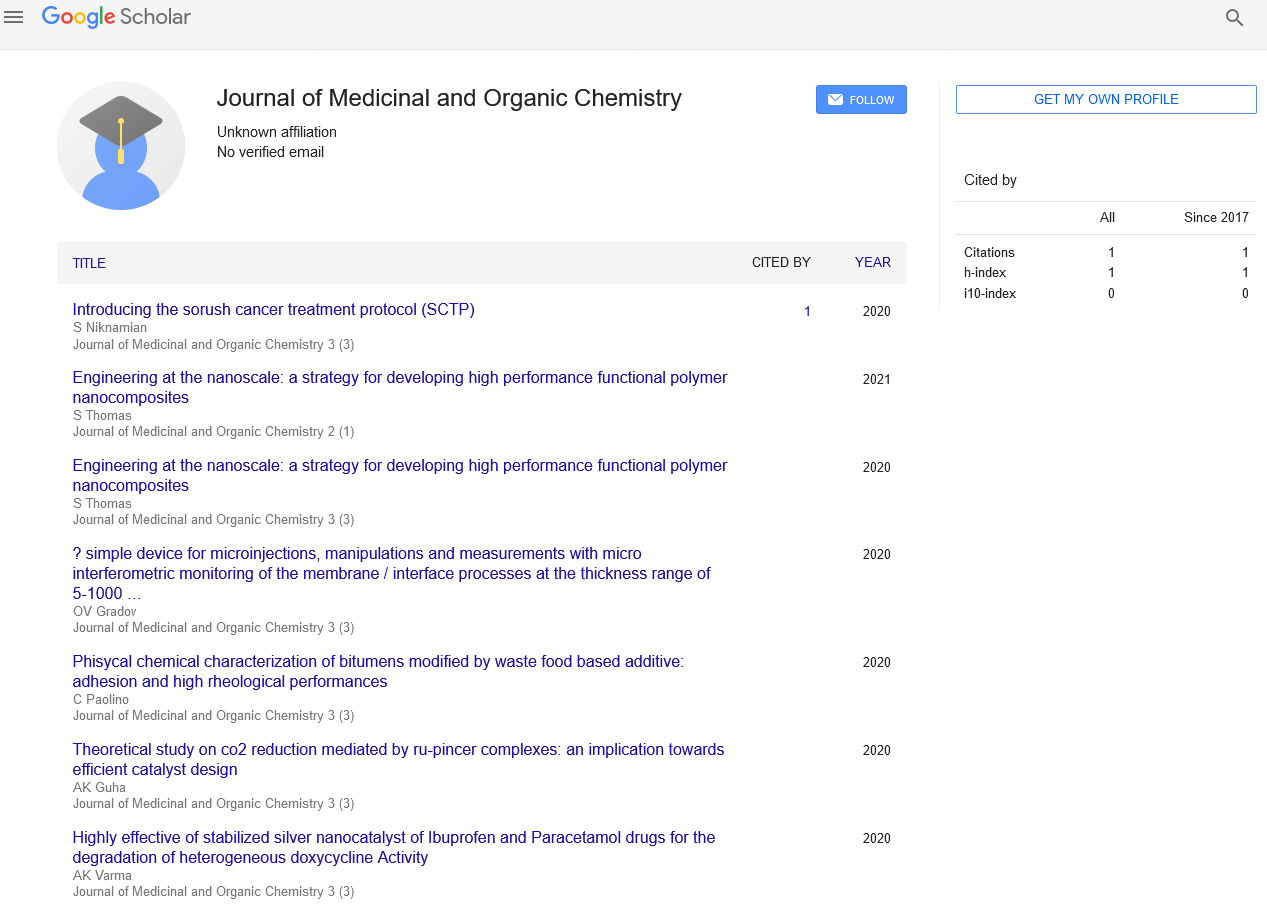Mini Review - Journal of Medicinal and Organic Chemistry (2023) Volume 6, Issue 3
Molecular Targets: Unlocking the Secrets of Cellular Function and Disease
Dr. Rajakrishnan Jansi*
Department of Molecular Targets and Functions, India
Department of Molecular Targets and Functions, India
E-mail: jansi.r@gmail.com
Received: 02-June-2023, Manuscript No. jmoc-23-101944; Editor assigned: 05-June-2023, PreQC No jmoc-23- 101944; Reviewed: 19-June-2023, QC No. jmoc-23-101944; Revised: 23- June-2023, Manuscript No. jmoc-23- 101944 (R); Published: 30-June-2023; DOI: 10.37532/jmoc.2023.6(3).61-64
Abstract
Molecular target-based therapies have revolutionized the field of medicine by enabling the development of highly specific and effective treatments for various diseases. This approach involves identifying key molecules, such as proteins or nucleic acids that play crucial roles in disease progression or are essential for the survival of pathogens. By selectively targeting these molecules with drugs or other therapeutic agents, it is possible to disrupt disease pathways, inhibit pathological processes, or eradicate infectious agents. This abstract provides an overview of molecular target-based therapies, including the identification of molecular targets, the design and development of targeted therapies, and the challenges associated with this approach. It highlights the significant impact of molecular target-based therapies on the treatment of cancer, infectious diseases, and other medical conditions. Furthermore, it discusses emerging trends and future prospects in the field, emphasizing the potential of personalized medicine and the development of novel molecular targets for improved therapeutic outcomes.
Keywords
Molecular targets • Argeted therapies • Personalized medicine • Disease pathways • Cancer • Infectious diseases • Drug design • Therapeutic agents • Medical conditions • Molecular biology
Introduction
The field of molecular biology has revolutionized our understanding of living organisms by delving into the intricate workings of cells and their components. At the heart of this knowledge lies the concept of molecular targets. Molecular targets refer to specific molecules within cells that play crucial roles in various cellular processes. Understanding these targets has become paramount in the development of new drugs and therapies, allowing researchers to combat diseases at their root cause. In this article, we will explore the significance of molecular targets, their diverse roles, and their immense potential in advancing medical science [1].
Molecular targets are specific proteins, nucleic acids, or other molecules within a cell that interact with external substances to initiate a biological response. They serve as key players in cell signalling pathways, influencing various cellular functions such as growth, division, metabolism, and apoptosis. By modulating the activity of these targets, researchers can manipulate cellular processes and potentially correct dysfunctions associated with diseases. In the realm of modern medicine and drug discovery, understanding the intricacies of molecular targets is crucial for developing effective therapeutic interventions [2]. Molecular targets refer to specific molecules or cellular components within an organism that are involved in disease processes or play a critical role in maintaining normal physiological functions. These targets can be proteins, nucleic acids, receptors, enzymes, or even specific genes. The identification and characterization of molecular targets have revolutionized the field of drug development, allowing researchers to design medications that selectively interact with these targets to elicit desired therapeutic effects. By focusing on specific molecular targets, researchers can increase the efficacy of drugs while minimizing potential side effects [3].
Molecular targets are key players in the development of therapeutics and hold immense potential for precision medicine. Understanding their role in disease pathogenesis and exploiting their vulnerabilities provide a foundation for designing targeted interventions that can revolutionize healthcare. As research in this field continues to progress, the discovery of novel molecular targets and the development of precise therapies are poised to shape the future of medicine [4].
Types of molecular targets
Receptors: Receptors are proteins embedded in cell membranes or located within the cell that receive signals from external molecules, such as hormones, neurotransmitters, or drugs. Binding of these molecules to their respective receptors triggers a cascade of intracellular events, ultimately resulting in a specific cellular response.
Enzymes: Enzymes are proteins that catalyze chemical reactions within cells [5]. They play a pivotal role in metabolism, DNA replication, protein synthesis, and other essential cellular processes. Targeting specific enzymes can modulate their activity and interfere with disease-related processes, making them attractive candidates for drug development [6].
Transporters: Transporters are proteins responsible for moving molecules across cell membranes. They regulate the transport of nutrients, ions, neurotransmitters, and drugs into and out of cells [7]. By targeting transporters, researchers can modulate the availability and concentration of specific molecules, influencing cellular functions and altering disease states.
Nucleic acids: Nucleic acids, including DNA and RNA, serve as critical molecular targets. By targeting specific nucleic acid sequences, researchers can interfere with gene expression, control protein synthesis, or detect genetic mutations associated with diseases [8]. This has led to the development of therapies such as gene editing and antisense oligonucleotides.
Significance in Drug Discovery and Development
Molecular targets are at the core of modern drug discovery and development processes. Identifying and understanding the roles of specific targets in diseases allow researchers to design drugs that selectively interact with these targets, modulating their activity and restoring normal cellular function. This approach, known as target-based drug discovery, has significantly enhanced the precision and efficacy of therapeutics.
Target-based drug discovery involves several steps, including target identification, validation, and lead compound development [9]. Advances in molecular biology, genomics, and high-throughput screening techniques have accelerated the identification and validation of novel molecular targets, providing researchers with a vast array of opportunities to tackle various diseases.
The Potential of personalized medicine:
One of the most promising aspects of molecular targets lies in personalized medicine. Every individual is unique, and their response to medications can vary greatly. By targeting specific molecular pathways or mutations unique to a patient’s disease, personalized medicine aims to develop tailored therapies that maximize efficacy while minimizing adverse effects.
For example, targeted therapies such as tyrosine kinase inhibitors have revolutionized cancer treatment by selectively inhibiting the activity of mutated proteins driving tumor growth. Similarly, monoclonal antibodies designed to target specific cell surface receptors have shown remarkable success in autoimmune diseases and cancer.
Challenges and future directions: While the field of molecular targets holds tremendous promise, several challenges remain. First, identifying relevant targets and developing drugs that specifically interact with them can be a complex and time-consuming process. Additionally, the emergence of drug resistance poses.
Understanding disease mechanisms: Molecular targets provide insights into the underlying molecular mechanisms of diseases. By studying the role and function of these targets, researchers can gain a better understanding of disease processes, signaling pathways, and aberrant molecular interactions. This knowledge is essential for designing drugs that can modulate the activity of these targets and thereby restore normal cellular function.
Rational drug design: Identification of molecular targets allows for the rational design of drugs. By understanding the structure and function of the target, researchers can develop drugs that specifically interact with and modulate the activity of the target molecule. This targeted approach increases the likelihood of drug efficacy while minimizing potential side effects or interactions with non-target molecules.
Drug efficacy and selectivity: Molecular targets serve as the primary focus for drug discovery efforts, as drugs must demonstrate efficacy and selectivity against their intended targets. By designing drugs that interact with specific molecular targets involved in a disease, researchers can increase the likelihood of achieving the desired therapeutic effect while minimizing offtarget effects. This selectivity enhances drug safety and reduces the potential for adverse reactions.
Personalized medicine: Molecular targets also play a significant role in the development of personalized medicine approaches. With advances in genomics and molecular diagnostics, researchers can identify specific molecular targets that are aberrantly expressed or mutated in individual patients. This knowledge allows for the development of tailored therapies that specifically target the molecular drivers of a patient’s disease, increasing treatment effectiveness and reducing the potential for adverse effects.
Biomarker discovery: Molecular targets can also serve as biomarkers, which are measurable indicators of biological processes or disease states. By identifying specific molecular targets associated with a disease, researchers can develop biomarker assays to detect and monitor disease progression or treatment response [10]. These biomarkers aid in patient stratification, drug development, and clinical trial design, enabling more efficient and targeted therapeutic interventions.
Conclusion
Molecular targeting has revolutionized the field of medicine and holds immense promise for the development of targeted therapies in various diseases. By identifying specific molecular targets within cells and tissues, researchers and clinicians can design drugs that selectively interact with these targets, leading to more effective treatments with fewer side effects. The advent of molecular targeting has greatly contributed to personalized medicine, as it allows for tailored treatments based on an individual’s specific molecular profile. By analysing genetic and molecular signatures, healthcare providers can identify the most suitable targets for intervention, leading to improved patient outcomes and enhanced therapeutic efficacy. In addition to cancer, molecular targeting has found applications in a wide range of diseases, including autoimmune disorders, cardiovascular conditions, and neurological disorders. Through the identification of key molecular players and pathways involved in these diseases, researchers are uncovering new treatment opportunities and potential targets for therapeutic intervention.
While molecular targeting has achieved significant advancements, challenges still remain. The identification of reliable and robust molecular targets, the development of drugs with high specificity and minimal off-target effects, and the emergence of resistance mechanisms are areas that require ongoing research and innovation.
Furthermore, molecular targeting has been instrumental in the development of novel cancer therapies. By focusing on specific molecular aberrations that drive cancer growth and progression, targeted therapies have shown remarkable success in inhibiting tumor growth and improving patient survival rates. Examples of successful molecularly targeted drugs include tyrosine kinase inhibitors and monoclonal antibodies, which have revolutionized the treatment landscape for various cancers.
Molecular targeting has ushered in a new era of precision medicine, offering the potential for more effective and personalized treatments across a wide range of diseases. Through continued scientific exploration and technological advancements, molecular targeting holds the promise of further improving patient outcomes and transforming the landscape of healthcare.
References
- Gaziano TA, Bitton A, Anand S et al. Growing epidemic of coronary heart disease in low and middle income countries. Current Problems in Cardiology. 35, 72-115 (2010).
- Shimazu T, Kuriyama S, Hozawa A et al. Dietary patterns and cardiovascular disease mortality in Japan: a prospective cohort study. Int J Epidemiol. 36, 600-609 (2007).
- Chockalingam A, Campbell NR, Fodor JG. Worldwide epidemic of hypertension. Canadian Journal of Cardiology. 22,553-555 (2006).
- Wang L, Wang FS, Gershwin ME. Human autoimmune diseases: a comprehensive update. Journal of Internal Medicine. 278, 369-395 (2015).
- Witebsky E, Rose NR, Terplan K et al. Chronic thyroiditis and autoimmunization. Journal of the American Medical Association. 164: 1439-1447 (1957).
- Volta U, Vincentini O, Silano M. Papillary cancer of thyroid in celiac disease. Journal of Clinical Gastroenterology. 45, e44-6 (2011).
- Harrison, Stephanie R, Danyang et al. Autoimmune Disease and Rheumatoid Arthritis. Calcified Tissue International. 106, 58-75 (2020).
- Katz U, Shoenfeld Y, Zandman-Goddard G. Update on intravenous immunoglobulins (IVIg) mechanisms of action and off- label use in autoimmune diseases. Current Pharmaceutical Design. 17, 3166-3175 (2011).
- Delaunois L. Anatomy and physiology of collateral respiratory pathways. The European Respiratory Journal. 2, 893-904 (1989).
- Meldrum OW, Chotirmall SH. Mucus, Microbiomes and Pulmonary Disease. Biomedicines. 9, 675 (2021).
Indexed at, Google Scholar, Crossref
Indexed at, Google Scholar, Crossref
Indexed at, Google Scholar, Crossref
Indexed at, Google Scholar, Crossref
Indexed at, Google Scholar, Crossref
Indexed at, Google Scholar, Crossref
Indexed at, Google Scholar, Crossref
Indexed at, Google Scholar, Crossref

